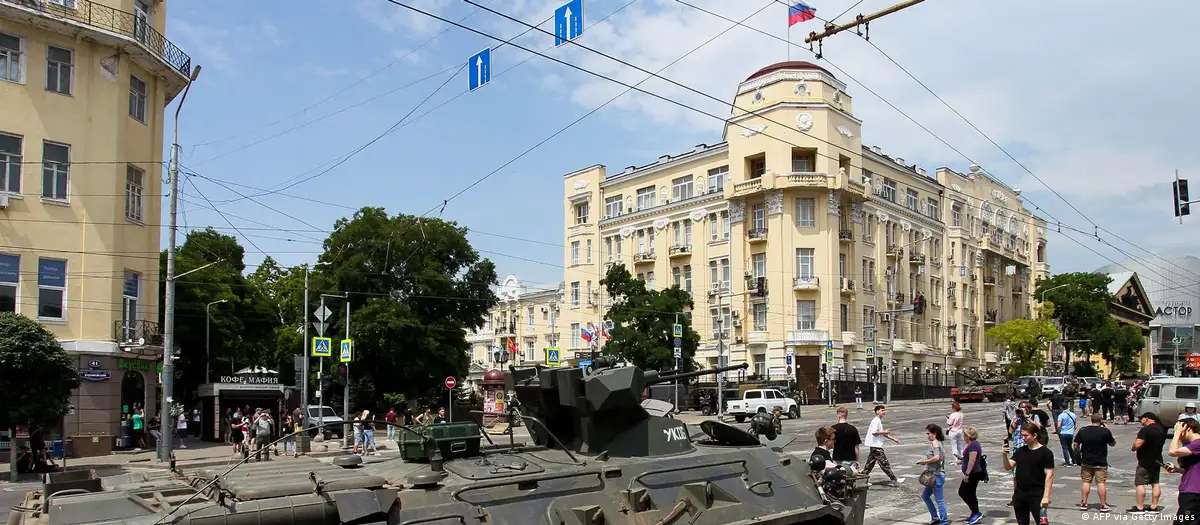After rebellion of the Wagner Group mercenaries, many questions remained open. But it seems certain that a turning point for the Russian president’s power has been reached, analysts say.
(DW) Putin has emerged weakened from the brief Wagner Group mutiny, the “emperor is naked” – at least with this lowest common denominator most analysts on events in Russia can agree. Incidentally, there is great perplexity about the short-term consequences of the rebellion of Yevgeny Prigozhin’s private army of mercenaries.
“The most important thing that can be seen is the fact that Putin has clearly lost authority,” says German Russia expert Fabian Burkhardt in an interview with DW. However, he notes that it is still to be negotiated about who has won in the Russian power structure. “Many actors in Russia were probably taken by surprise by this situation,” says Burkhardt, a researcher at the Leibniz Institute for East and Southeast European Studies.
The beginning of the collapse of Putin’s power?
“For me, it’s the beginning of the collapse of the system,” says Irina Scherbakowa, cofounder of the banned Memorial human rights organization in Russia, in an interview with Deutschlandfunk radio.
And in the United States, historian and Yale University professor Timothy Snyder wrote in an early analysis, “In no Russian city have you seen anyone spontaneously expressing personal support for Putin or even taking personal risks for his regime.”
Prigozhin’s march toward Moscow showed both the Russian people and the entire world “that a small troop” can reach Moscow with relative ease, Snyder points out. “That was not the case before much of the Russian Ammunition Forces were employed in Ukraine,” says the historian, pointing out that such units are now unavailable in Russia.

No troops at home
According to this logic, Putin would have deprived himself of unlimited power in Russia through his war of aggression in Ukraine, which violated international law and shook his military power base in his own country. But do recent events in Russia also, in fact, describe a political “culmination” for Putin – in other words, the beginning of the end of his rule?
That’s what Sherbakova, who lives in exile in Berlin, thinks. “But what we don’t know is how long that will take,” she says.
For Snyder, meanwhile, the “apathy” in Russia “suggests that most Russians at this point simply assume that they are ruled by the gangster with the most guns and go about their daily lives, regardless of who that gangster is.” But the Yale historian is convinced: “If he is cornered, Putin will save himself.”
Wars end with internal pressure on the aggressor
After the recent events, attention is turning to the fighting in southern and eastern Ukraine and the question of whether Putin can escalate the war once again to consolidate his power base in the Kremlin or whether the Wagner Group mutiny can later be seen as the beginning of the end of the war.
“Wars usually end when the pressure within the political system is felt,” says Snyder. Referring to the more than 50 nations supporting Ukraine, led by the U.S., the historian is clear: “Those who want this war to end must help the Ukrainians exert that pressure.”
So far, it is unclear whether the Ukrainian Army can take advantage on the front lines from what is happening in Russia, even in the short term. Above all, it remains to be seen whether this will in fact weaken the Russian fighting force.
“It is difficult to assess what Russian soldiers in Ukraine have really learned from the mutiny,” says German security expert Nico Lange in an interview with DW. “Their cell phones are taken, and they are very far removed from reality,” says the Ukraine and Russia expert, who also works for the Munich Security Conference.
Unrest among Russian commanders
Restlessness at the level of the Russian commanders, however, has probably increased, according to Lange. Moreover, the hard core of Prigozhin’s troops is absent at the front for the time being.
At the moment, it is still unclear how quickly and whether the 25,000-strong Wagner Group troops can be integrated into the regular Russian Army after they temporarily occupied the Russian Army’s Southern High Command in Rostov-on-Don, Russia.
The city of more than a million people is one of the nerve points for supplying Russian forces in the so-called land corridor between Russia and Crimea, occupied by Putin’s Army. The second is the Crimean bridge across the Kerch Strait.
Interrupting these supply routes is one of the Ukrainian Army’s military objectives in the ongoing counteroffensive. Without ammunition supplies, there is no Russian defense. Putin cannot allow that to happen.
And Wagner Group chief Prigozhin took advantage of this with his mutiny – the dispute between Prigozhin and Russian Defense Minister Serguei Shoigu had been going on for months. The mercenary chief accused the Russian military of failing to provide adequate supplies to his personnel, even during the months of fighting around the eastern Ukrainian city of Bakhmut.
Now, the occupation of Russia’s Southern Command in Rostov-on-Don may have helped Prigozhin get the best deal for him with the Kremlin, after it became clear that no other protagonist in Putin’s power structure would succeed him after the mutiny began.
